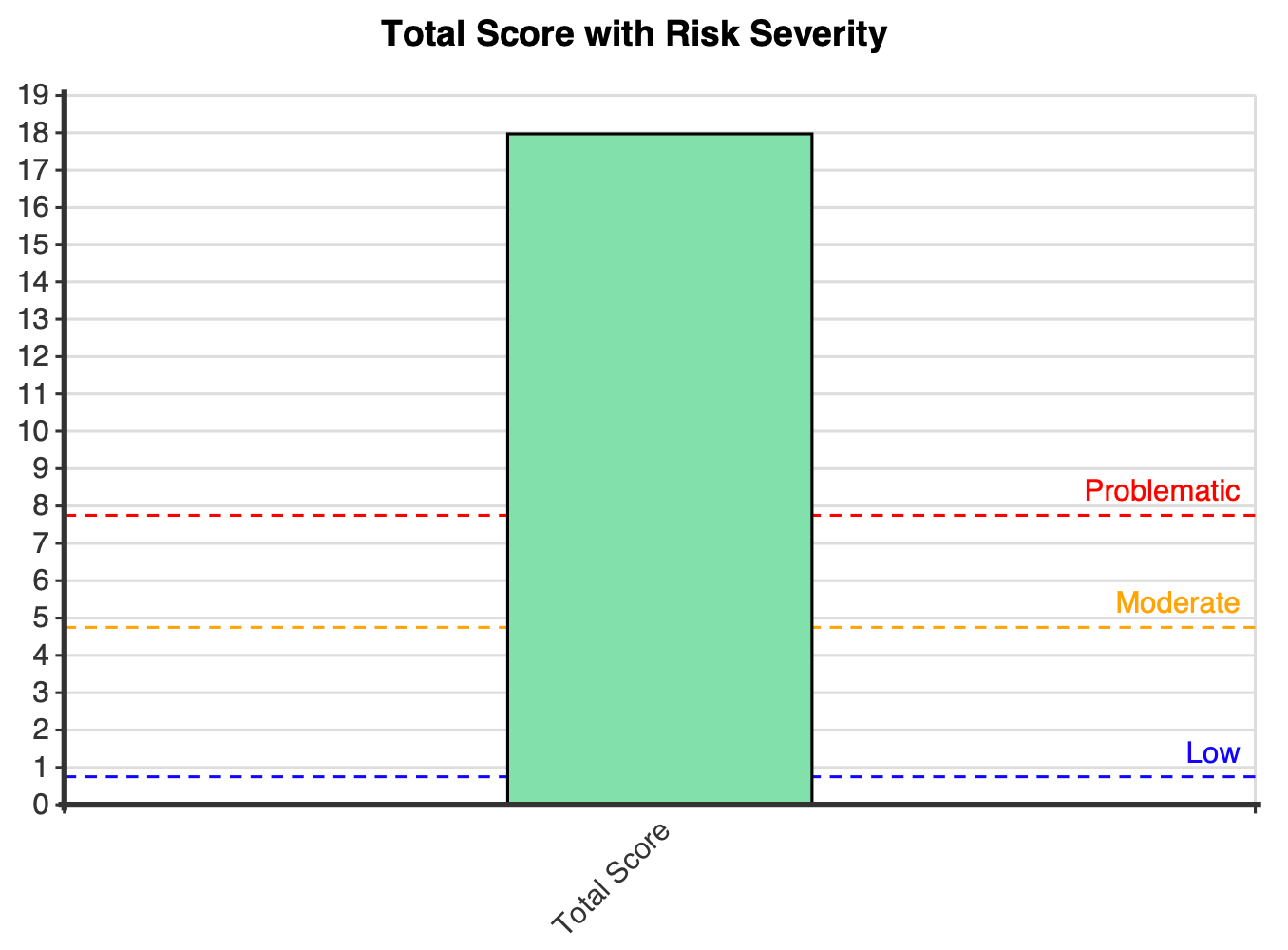The Problem Gambling Severity Index (PGSI) is a brief, 9-item, self-report measure of problematic gambling behaviours in the general population (Ferris & Wynne, 2001). The PGSI is able to identify different subgroups of problem gamblers with different levels of risk status (none, low, moderate, and problematic).
The PGSI is a useful tool for many clinicians dealing with gambling issues because it is an efficient, reliable, and effective instrument for assessing the severity of gambling problems and guiding the therapeutic process.
Example PGSI items:

The PGSI can be used to screen for gambling problems, to tailor intervention strategies, or to track treatment outcomes. The PGSI is specifically designed to identify the severity of problematic gambling behaviours. It helps clinicians distinguish between non-problematic recreational gamblers and those who may be at risk of developing, or who already have, a gambling disorder.
By determining the severity of a client’s gambling problems, the PGSI provides essential information that can guide the development of tailored intervention strategies. Clinicians can use the results to prioritise treatment goals, select appropriate therapeutic approaches, and allocate resources effectively.
The PGSI can be used not only at the initial assessment but also throughout the treatment process to monitor changes in the client’s gambling behaviours. This tracking helps clinicians evaluate the effectiveness of the interventions and make necessary adjustments to the treatment plan.
A total score is presented (0 – 27) where a higher score is indicative of more severe problematic gambling behaviours.

For ease of reference, a severity index is provided for the total score based upon prior research. Scores of 0 are considered to be a severity of “none”, scores of 1-4 are considered “low”, scores of 5-7 are considered “moderate” and scores of 8 and above are considered to be “problematic” severity (Currie et al., 2010; Currie et al., 2013).

A plot is displayed if the PGSI is administered more than once. The plot shows the total score over time with dotted lines indicating the cutoff points for the severity indexes. Although the total score is out of 27, scores greater than 10 are very infrequent (Currie et al., 2013) and so the y-axis may be truncated if scores are greater than or equal to 10 for ease of reading the plot.
The PGSI demonstrates a unidimensional factor structure, good internal consistency (α = .84 – .86; Currie et al., 2013; Ferris & Wynne, 2001; Holtgraves, 2009), adequate test–retest reliability (r = .78), and construct validity as evidenced by correlations with gambling frequency (Ferris & Wynne, 2001; Miller et al., 2013). This unidimensional structure has been subsequently confirmed by CFA (Miller et al., 2013) and IRT has determined that all items are useful in determining problematic gambling behaviours (Miller et al., 2013; Sharp et al., 2012).
The severity index categories have been well-validated (Currie et al., 2013), with the difference between the moderate and problem gamblers being very large on many dimensions of problematic gambling. However, it was found that the difference between the low and moderate categories was somewhat problematic due to there being no statistically significant difference between many different dimensions of problematic gambling behaviour (Currie et al., 2010; Currie et al., 2013). As a result, Currie et al. (2013) suggested slightly modifying Ferris and Wynne’s (2001) original cutoffs for the severity index categories:
These changes improved the distinctiveness of these categories on many dimensions (Currie et al., 2013). Most notably, the preference for high risk games was not significantly different between these groups with the original scoring but became significant using the revised scoring.
Ferris, J., & Wynne, H. (2001). The Canadian Problem Gambling Index (Final report). Ottawa, Ontario, Canada: Canadian Centre on Substance Abuse. https://www.greo.ca/Modules/EvidenceCentre/files/Ferris%20et%20al(2001)The_Canadian_Problem_Gambling_Index.pdf
Currie, S. R., Casey, D. M., & Hodgins, D. C. (2010). Improving the psychometric properties of the Problem Gambling Severity Index. Ottawa: Canadian Consortium for Gambling Research.
Currie, S. R., Hodgins, D. C., & Casey, D. M. (2013). Validity of the problem gambling severity index interpretive categories. Journal of gambling studies, 29, 311-327. https://doi.org/10.1007/s10899-012-9300-6
Holtgraves, T. (2009). Evaluating the problem gambling severity index. Journal of gambling studies, 25, 105-120. https://doi.org/10.1007/s10899-008-9107-7
Miller, N. V., Currie, S. R., Hodgins, D. C., & Casey, D. (2013). Validation of the problem gambling severity index using confirmatory factor analysis and rasch modelling. International journal of methods in psychiatric research, 22(3), 245–255. https://doi.org/10.1002/mpr.1392
Sharp, C., Steinberg, L., Yaroslavsky, I., Hofmeyr, A., Dellis, A., Ross, D., & Kincaid, H. (2012). An Item Response Theory Analysis of the Problem Gambling Severity Index. Assessment, 19(2), 167-175. https://doi.org/10.1177/1073191111418296
NovoPsych’s mission is to help mental health services use psychometric science to improve client outcomes.
© 2023 Copyright – NovoPsych – All rights reserved